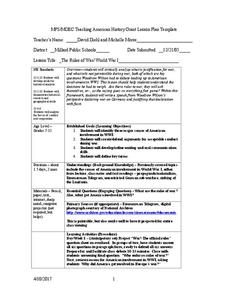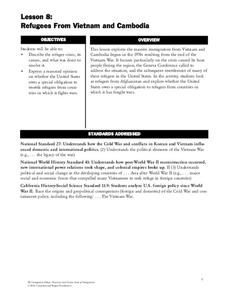Smithsonian Institution
Racism and Removal: Japanese Incarceration During World War II
During World War II people saw how far the government's control would go, but it was at the expense of its citizens. The resource brings the conditions of Japanese American internment camps to light using primary documents. Scholars...
Curated OER
The Insurgency In Iraq: A Quandary for the U.S.
Students read articles, conduct Internet research and participate in a mock debate to explore the pros and cons of withdrawing from Iraq or remaining in conflict with the insurgency. They consider the difficulties of consensus building...
Curated OER
The Dropping of the Atomic Bomb at Hiroshima and Nagasaki
Take an in-depth look at the historical events in Hiroshima and Nagasaki in this 69-slide PowerPoint. Photos, facts, and transcripts are outlined in this presentation in order to answer the stated essential question in slide 2: "What...
Smithsonian Institution
Two Perspectives on the Battle of Little Bighorn/Greasy Grass
Learners understand why historians conduct research and the importance of perception when it comes to studying history. The resource covers The Wars of Expansion and the Battle of Little Bighorn/Greasy Grass through group work, debate,...
PBS
The Sixties: Notes from the Ho Chi Minh Trail
Young historians research the rationales for fighting the Vietnam War, and the controversies surrounding it. They watch film clips, examine photographs, and read Lyndon B. Johnson's message to Congress to gather information for a...
ProCon
Drone Strikes Overseas
Should the United States continue the practice of using drone strikes abroad? Readers explore the top pro and con arguments in preparation for a debate or discussion about the topic. They read about the history of drone strikes, view a...
Theodore Roosevelt Association
Defining America's Role in the World
As the first American president to win the Nobel Peace Prize, and only one of four presidents to do so in United States history, Theodore Roosevelt's foreign policy achievements and preservation of peace are often overshadowed by his...
University of California
Decolonization
The ripple effect from one small event can impact many others. Young historians research the ripple effect World War II had on decolonization in the second installment of an eight-part series. Through primary and secondary documents as...
National Constitution Center
Born in the U.S.A: Music as Political Protest
Though often used in shows of patriotism, Bruce Springsteen's 1985 song "Born in the U.S.A." is critical of America's role in the Vietnam war and its treatment of American veterans. High schoolers analyze the song's lyrics in an activity...
Polk County Public Schools
The Blame Game for the Loss at Pearl Harbor
Known as the day that will live in infamy, the attack on Pearl Harbor in 1941 was a shock to all. But why was the United States unprepared on that December morning? Study a series of primary sources in a document-based question that...
Curated OER
Who Started World War I?
Young scholars debate which power was responsible for the outbreak of World War I. In this cause and effects lesson plan, students research the causes of the outbreak of World War I on ProQuest in preparation for a (limited) reenactment...
Curated OER
Atomic Bomb Debate
Students research the decision to end World War II by dropping the atomic bomb. In this world history instructional activity, students explore information on the atomic bomb and the decision of the tactics to use it. They...
Curated OER
America's Wars, 1898-1945
Learners examine the wars the United States was involved in between 1898 and 1945. In groups, they determine the causes and effects of each war and how each war changed the way the United States handled their foreign affairs. As a class,...
Curated OER
The Rules of War/World War I
Young scholars explore the reasons the United States became involved in World War I. In this World History lesson, students research the reasons Woodrow Wilson made the decisions he did, prepare a debate and write a paper.
Curated OER
Debating Iraq
Students analyze the main themes of President Bush's UN Speech and discussion of the NewsHour report on the Iraq Debate. In this debate lesson, students answer pre-listening questions and view a transcript of the speech. In groups of two...
Curated OER
To War Or Not To War?
Seventh graders research the political, societal, and economic factors of World War I, World War II, and the 2001 war against terrorism. They participate in class discussions, write journal entries, and conduct Internet research. ...
Curated OER
Italian Enemy Aliens During World War II: Evacuation from Prohibited Zones
Students read and discuss the Enemy Alien Evacuation Order. They perform research by reading newspaper articles from February 1942 as well as investigating available information on the Internet. Students work in groups to create a...
Curated OER
Multiple Perspectives on the Korean War
Students interpret historical evidence presented in primary and secondary resources. In this Korean War activity, students examine and analyze primary sources regarding U.S. involvement in the Korean War.
University of California
The Civil War: Secession of the South
Was the Southern states' decision to secede from the Union protected by the United States Constitution? Eighth graders discuss the constitutionality of the South's justification for secession, particularly the secession of South...
PBS
President Theodore Roosevelt: Foreign Policy Statesman or Bully?
Can a negative perception of a president's foreign policy harm his or her historical legacy? A project that winds the clock back to the date of Theodore Roosevelt's death puts students at the editorial desk of a fictional newspaper....
Constitutional Rights Foundation
Refugees From Vietnam and Cambodia
The United States may have pulled its troops from the Vietnam War in 1973, but the conflict was far from over for the citizens living in Asia at the time. An informative resource lets learners know about the wave of over 220,000...
Constitutional Rights Foundation
U.S. Immigration Policy and Hitler’s Holocaust
Though the Statue of Liberty welcomes political refugees to her shores, the welcoming sentiment has not always been reflected in the American citizenry. High schoolers read about the regrettable period in United States history...
US National Archives
WWII: Western Europe 1939-45 – Hamburg
Was bombing German cities an effective means to an end, or was it a war crime? Could it be both? Young historians ponder these questions with an activity that prompts them to use primary sources to summarize the debate surrounding RAF...
Curated OER
Freedom by the Fireside: The Legacy of FDR's "Four Freedoms" Speech
Middle schoolers read and analyze Franklin Delano Roosevelt's 1941 State of the Union Address. They listen to recordings of speeches by F.D.R., answer discussion questions, and participate in a debate.
Other popular searches
- Mexican American War Debate
- Cold War Debate Questions
- Civil War Debate
- Civil War Debate Topics
- Cold War Debate
- Middle East War Debate Causes























